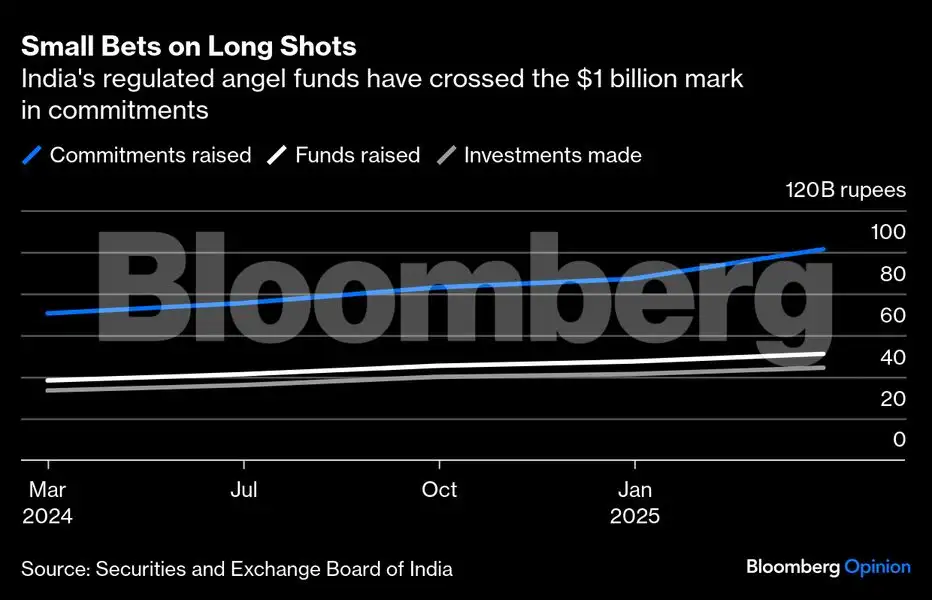Until recently, affluent individuals who placed small bets on long shots were targeted with a bizarre “angel tax,” which viewed startups’ fundraising as taxable income. Now that the government has finally scrapped the draconian levy, the Securities and Exchange Board of India has sown fresh seeds of disquiet for people who want to try early-stage allocations via collective investment plans: It wants them to get accredited.
Commitments into angel funds have swelled by 44% over the past year, and investments have surged by a third. These are reasonable growth rates, but the SEBI seems to believe that it can give a further boost to the “ease of doing business.”
Although that’s a welcome sentiment, some caution is warranted. As a risk-taking culture spreads beyond established business families, new sources of finance must emerge. If angel funds exit the scene because their investors don’t want to seek accreditation, many promising entrepreneurs may have to drop out before their first meeting with venture capital or private equity.
The regulator means well. It wants to unshackle angel investors from India’s Companies Act, which limits participation in private placement of securities to 200 subscribers. Any more will require public offerings. But this rule is unfair to regulated funds, where professional managers are required to have skin in the game. Plus, the risks are explained in a memorandum, and explicit investor consent is needed for each bet. There’s clearly a need to distinguish between private placements and angel investing. But how does the regulator sidestep a law made by parliament?
It has come up with a plan. From next year, individuals who invest in angel funds will be treated as Qualified Institutional Buyers. Since the law exempts QIBs from the 200-person rule, managers will no longer have to limit participation. This “would allow angel funds to show opportunities to a wider pool of eligible investors, while staying in conformity with the Companies Act,” the SEBI said last month.There’s a catch, however. Since individuals aren’t really institutions, the SEBI wants them to become accredited investors like in the US to qualify for the exemption. They will have a year to adjust to the new regime. Trouble is that while 13% of Americans meet the thresholds for buying private securities, so far only 650 Indians have successfully applied for accreditation, according to ET Wealth. That makes them rarer than the Bengal tiger, an endangered species.
 Bloomberg
BloombergDo only 0.00005% of Indians earn more than 20 million rupees ($230,000) annually, or have a net worth in excess of $860,000? Not really. Counting just the top tax payers, at least 60,000 people should easily meet those minimum standards. But to get accredited, people have to provide proof to third parties. In a country where authorities send tax bills to roadside vegetable vendors by tracing QR-code-based payments, it’s in nobody’s interest to furnish documentation showing how rich they are. Not when the memory of the disastrous “angel tax” is still fresh.
Even if the goal is to drive accreditation, why single out startup investors who are doing something worthwhile with their money and time? That already sets them apart from the nine out of 10 Indian retail traders betting on equity options and being taken to the cleaners by big whales like Jane Street. The public-market casino is where the regulator needs to police participation. Private markets don’t need the same level of scrutiny beyond ensuring that the capital entering fledgling firms is not tainted.
At present, angel investors only self-certify a minimum net worth to their fund manager. The thresholds are low, as is the compliance burden. It is a lax process. Not everyone who is being invited to dabble in unlisted securities has the risk appetite for it. But as long as they are giving informed consent, they can be safely left alone. It’s the insurance and banking regulators that have to put a stop to much more widespread deceptive selling in their industries. Why’s the SEBI rushing to fix what isn’t broken?
The $1.2 billion that angels have committed so far may not produce superstar enterprises. That’s fine, as long as a growing pot of money helps nurture some gritty entrepreneurs. As I wrote last week, millennial and Gen Z billionaires among India’s traditional family-owned firms are bored with business. They don’t fancy their chances against either large tycoons, or smart startup founders. But the latter need financing.
The SEBI’s other ideas are laudable. Relaxing the floor and cap on investments, doing away with concentration limits on exposure, and allowing funds to keep backing startups as they mature will improve returns. But forcing investors to get accredited by third parties? That’s sure to backfire, unless the SEBI itself obtains their permission to query the tax returns database. A simple yes or no answer to the eligibility question, based on information they have already shared with tax authorities, could help increase the number of 650 accredited investors manifold. The rich in India are far from endangered, but they don’t want to flaunt their stripes any more than they have to.
Content Source: economictimes.indiatimes.com
